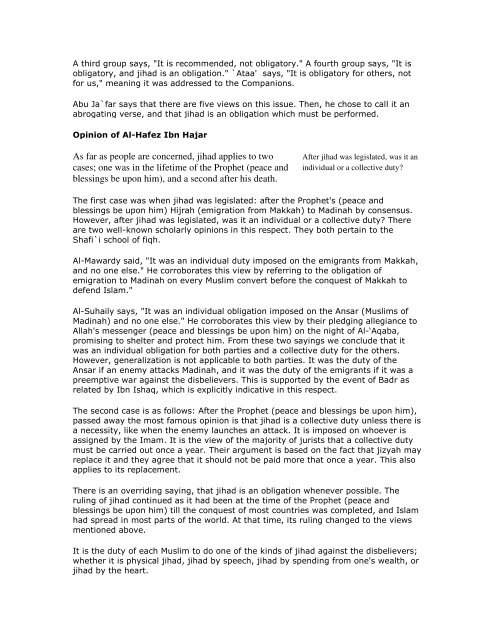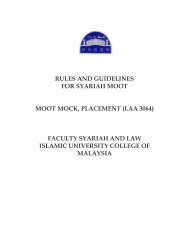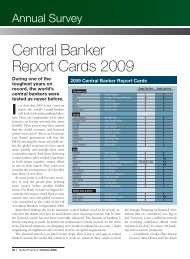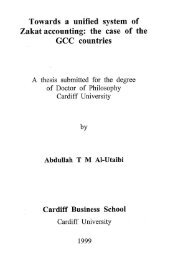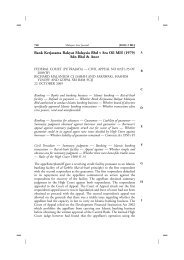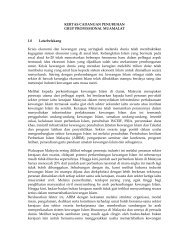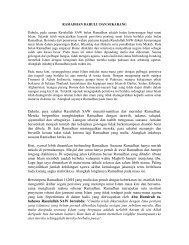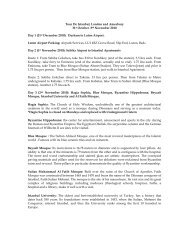Fiqh al Jihad Sheikh Yusuf al Qaradhawi
Fiqh al Jihad Sheikh Yusuf al Qaradhawi
Fiqh al Jihad Sheikh Yusuf al Qaradhawi
Create successful ePaper yourself
Turn your PDF publications into a flip-book with our unique Google optimized e-Paper software.
A third group says, "It is recommended, not obligatory." A fourth group says, "It is<br />
obligatory, and jihad is an obligation." `Ataa' says, "It is obligatory for others, not<br />
for us," meaning it was addressed to the Companions.<br />
Abu Ja`far says that there are five views on this issue. Then, he chose to c<strong>al</strong>l it an<br />
abrogating verse, and that jihad is an obligation which must be performed.<br />
Opinion of Al-Hafez Ibn Hajar<br />
As far as people are concerned, jihad applies to two<br />
cases; one was in the lifetime of the Prophet (peace and<br />
blessings be upon him), and a second after his death.<br />
After jihad was legislated, was it an<br />
individu<strong>al</strong> or a collective duty?<br />
The first case was when jihad was legislated: after the Prophet's (peace and<br />
blessings be upon him) Hijrah (emigration from Makkah) to Madinah by consensus.<br />
However, after jihad was legislated, was it an individu<strong>al</strong> or a collective duty? There<br />
are two well-known scholarly opinions in this respect. They both pertain to the<br />
Shafi`i school of fiqh.<br />
Al-Mawardy said, "It was an individu<strong>al</strong> duty imposed on the emigrants from Makkah,<br />
and no one else." He corroborates this view by referring to the obligation of<br />
emigration to Madinah on every Muslim convert before the conquest of Makkah to<br />
defend Islam."<br />
Al-Suhaily says, "It was an individu<strong>al</strong> obligation imposed on the Ansar (Muslims of<br />
Madinah) and no one else." He corroborates this view by their pledging <strong>al</strong>legiance to<br />
Allah's messenger (peace and blessings be upon him) on the night of Al-‘Aqaba,<br />
promising to shelter and protect him. From these two sayings we conclude that it<br />
was an individu<strong>al</strong> obligation for both parties and a collective duty for the others.<br />
However, gener<strong>al</strong>ization is not applicable to both parties. It was the duty of the<br />
Ansar if an enemy attacks Madinah, and it was the duty of the emigrants if it was a<br />
preemptive war against the disbelievers. This is supported by the event of Badr as<br />
related by Ibn Ishaq, which is explicitly indicative in this respect.<br />
The second case is as follows: After the Prophet (peace and blessings be upon him),<br />
passed away the most famous opinion is that jihad is a collective duty unless there is<br />
a necessity, like when the enemy launches an attack. It is imposed on whoever is<br />
assigned by the Imam. It is the view of the majority of jurists that a collective duty<br />
must be carried out once a year. Their argument is based on the fact that jizyah may<br />
replace it and they agree that it should not be paid more that once a year. This <strong>al</strong>so<br />
applies to its replacement.<br />
There is an overriding saying, that jihad is an obligation whenever possible. The<br />
ruling of jihad continued as it had been at the time of the Prophet (peace and<br />
blessings be upon him) till the conquest of most countries was completed, and Islam<br />
had spread in most parts of the world. At that time, its ruling changed to the views<br />
mentioned above.<br />
It is the duty of each Muslim to do one of the kinds of jihad against the disbelievers;<br />
whether it is physic<strong>al</strong> jihad, jihad by speech, jihad by spending from one's we<strong>al</strong>th, or<br />
jihad by the heart.


